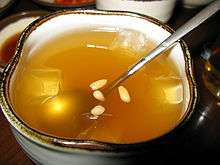Maesil-cha
 Cold maesil-cha (plum tea) with pine nuts | |
| Type | Herbal tea |
|---|---|
| Country of origin | Korea |
| Ingredients | Maesil (plums), maesil-cheong (plum syrup), or omae (smoked plums) |
| Korean name | |
| Hangul | 매실차 |
|---|---|
| Hanja | 梅實茶 |
| Revised Romanization | maesil-cha |
| McCune–Reischauer | maesil-ch'a |
| IPA | [mɛ.ɕil.tɕʰa] |
Maesil-cha (매실차; 梅實茶) or plum tea is a traditional Korean tea made from maesil (fresh plums), omae (smoked plums), or maesil-cheong (plum syrup).[1][2]
Preparation
Most commonly, maesil-cha is made by mixing maesil-cheong (plum syrup) with hot or cold water.[2]
Sometimes, plum tea is made with plum extract, made by grating green plums, mixing it with small amount of water and juicing through hemp cloth, and sun-drying it.[3] The extract is kept in a glass container in a cool area, and mixed with hot water to make tea.[3]
Plum tea made with smoked plums are usually called omae-cha ("smoked plum tea").
Physiological activation efficacy[3]
- Blood purification action for fatigue recovery Acetic acid, glucose, and lactic acid neutralize the fatigue factors and assist in blood purification.
- Proving of appetite and improvement of gastrointestinal conditions The malic acid in Maesil makes the intestines actively linked together, helping to break down protein and strengthen strength.
- Prevention of aging Maesil stimulates the salivary gland to secrete saliva, causing a lot of parotin. This makes the tissue of bone, muscle, and blood vessels grow younger again.
- Detoxification action Maesil has strong sterilizing power and it is good for food poisoning.
Toxicity and side effects[3]
- Less ripe Maesil contains amygdalin, which contains liquidation, so it can be poisoned if people eat raw. However, if salt or wine is dipped into the Maesil, the poison disappears and the effect appears.
- Maesil is acidic and can injure teeth and cause heat.
See also
- Maehwa-cha – plum blossom tea
- Maesil-ju – plum wine
- Suānméitāng – Chinese sour plum drink
References
- ↑ Won, Ho-jung (22 April 2016). "[Weekender] Healthful Korean tea to fit every need". The Korea Herald. Retrieved 16 June 2017.
- 1 2 "maesil-cha" 매실차. Doopedia (in Korean). Doosan Corporation. Retrieved 16 June 2017.
- 1 2 3 4 정, 동효; 윤, 백현; 이, 영희, eds. (2012). "매실차의 건강기능 효과". Cha Saenghwal Munhwa Daejeon 차생활문화대전 (in Korean). Seoul: Hong Ik Jae. ISBN 9788971433515. Retrieved 9 June 2017 – via Naver.
This article is issued from
Wikipedia.
The text is licensed under Creative Commons - Attribution - Sharealike.
Additional terms may apply for the media files.